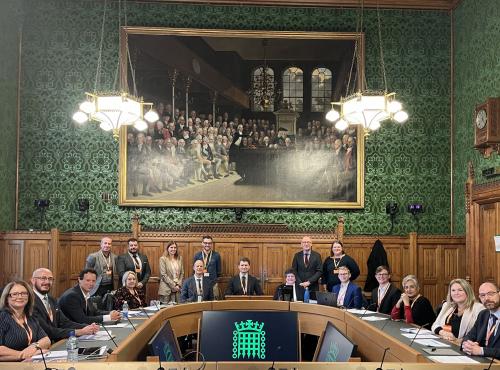The ATech Policy Lab – a new venture in Assistive and Accessible Technology from Policy Connect, with supporting partners Bournemouth University and the Ace Centre
The last two years have seen rapid digitalisation in response to the pandemic – from our workplaces, to shopping, to public services. This trend is only set to intensify as policy makers are putting technology and innovation at the heart of plans to tackle the most pressing challenges of our time, from building back our economy, to net-zero, health and social care, and levelling-up.
In that context, we urgently need to make technology work for everyone. When we get it right, technology can be life-changing for older and disabled people – and accessible design benefits all users. As someone who uses and relies on assistive and accessible technology (ATech) every day, I know how high the stakes are, and how powerful the benefits can be. The UK has an opportunity to lead the world in how to use technology to build a truly inclusive society.
The message is cutting through. ATech has the attention of policymakers as never before. The government’s National Disability Strategy makes tech a clear priority across departments, encapsulated by a new ambition to ‘help make the UK the most accessible place in the world to live and work with technology’. The Strategy’s flagship commitment on technology is to scope the case for ‘a world leading Centre for Assistive and Accessible Technology’. The Leader of the Opposition also discussed ATech for education and employment in his most recent speech to Party Conference. This is a step-change and represents a huge success for the collaborative efforts of everyone who has champion the importance of ATech.
The All-Party Parliamentary Group for Assistive Technology (APPGAT), supported by Policy Connect, has been instrumental in pressing for this change of approach. The APPGAT and its stakeholders from disability groups, the tech sector, academia, practitioners and ATech users will be critical in ensuring that ATech rises even higher up the political agenda over the coming years.
To capitalise even further on this momentum, we need to translate political enthusiasm and the government’s over-arching policy commitments into well-designed, evidence-based, and funded initiatives that will transform ATech access and support for users on the ground.
That’s why Policy Connect, in partnership with Bournemouth University and the Ace Centre, is launching a new venture: the ATech Policy Lab. The Lab will bring together stakeholders from the tech and disability sectors with policymakers to design evidence-based policy that makes technology enabling for everyone. Bournemouth University has made ATech one of its four Strategic Investment Areas, building on its established research specialism in the field. Ace Centre is a Charity providing support for people with complex communications difficulties using technology. For over five-years, Policy Connect has been the leading think tank developing new thinking on ATech through its collaborative approach to informing public policy; most recently we delivered a series of policy design workshops in partnership with the Cabinet Office Disability Unit, from which we developed proposals that would become the government’s commitment to “explore the establishment of a world-leading Centre for Assistive and Accessible Technology”.
Now is the time to get into the detail of ATech policy design, bringing together disabled people, sector leaders and researchers to incubate new ideas, stress test our best proposals, and generate the evidence and insight that moves policymakers to action. To do this, the Lab will hold interactive policy design workshops, produce targeted policy proposal papers, and collaborate on research projects on disability and tech, ensuring findings address critical policy questions and achieve impact. This will include work to help further inform the Government’s development of the case for a Centre for Assistive and Accessible Technology.
Collaboration will be at the heart of everything the ATech Policy Lab does, working with the APPGAT and stakeholders across the disability and tech sectors. The partnership with Bournemouth University and the Ace Centre will provide academic rigour and expertise in service delivery to our work as part of a diverse community of stakeholders.
On 8th February, we will launch the Lab in Parliament as part of an APPG for Assistive Technology symposium on ATech and the National Disability Strategy.
I am excited to lead the ATech Policy Lab along with my talented and growing team. We all share the conviction that we need better public policy to unlock the full potential of technology to break down barriers for disabled people and to bring the benefits of accessibility to everyone. I look forward to working with everyone who shares this vision as we turn it into a reality.


